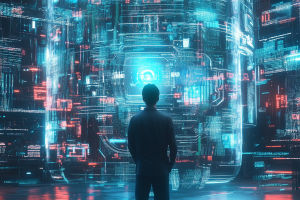
Two years ago—on December 1, 2022, at precisely 2:02 a.m.—the AI industry witnessed a monumental moment.
That was the day ChatGPT, the harbinger of the next AI wave, was officially launched.
Two Years That Changed Everything
The past two years feel both vivid and fleeting, like a whirlwind that transformed the landscape of technology and society. On this second anniversary of ChatGPT's debut, it’s worth reflecting on the remarkable milestones, groundbreaking developments, and heartwarming stories that have unfolded since that fateful night.
Part 1: The Ten Most Pivotal Moments in AI
ChatGPT's Thunderous Launch
On December 1, 2022, Sam Altman sent out a simple tweet: "Try ChatGPT." What followed was a seismic shift in technology. This seemingly ordinary decision to launch the product on December 1 turned out to be one of the most significant turning points in AI history.
Within five days, ChatGPT reached one million users—a record-breaking pace for any internet product. Two months later, it hit 100 million monthly active users. Silicon Valley was shaken: Google declared a "Code Red," Meta scrambled to adjust its strategies, and the dawn of a new era was undeniable.
The Turning Point in AI-Controlled Image Generation
On February 10, 2023, the release of ControlNet revolutionized the Stable Diffusion ecosystem. This breakthrough gave creators unprecedented control over AI-generated art, enabling precise outputs from line drawings, depth maps, and edge detection.
ControlNet became a game-changing plugin for AI art workflows, making the process more predictable and reliable. Its inventor, Zhang Lümin, earned the moniker "Cyber Buddha" for his groundbreaking contribution. From that moment, AI became less of a black box and more like a precision tool—a brush in the hands of its users.
Top 10 Amazing (Somewhat Terrifying) Facts about AI
Video by TopTenz
The Unveiling of GPT-4
On March 14, 2023, OpenAI released GPT-4 in a well-anticipated launch. Despite the build-up, the world was still astounded. GPT-4 aced the bar exam, solved advanced math problems, and interpreted complex images with an expertise that rivaled human specialists.
This leap from GPT-3 to GPT-4 was not just numerical; it marked a watershed moment in AI's journey toward general intelligence. For the first time, people saw the contours of a future defined by AI capabilities beyond imagination.
NVIDIA’s Trillion-Dollar Milestone
On May 30, 2023, NVIDIA's market capitalization surpassed $1 trillion, making it the first chip company—and the seventh global company overall—to join the trillion-dollar club.
This monumental achievement was fueled by the AI era’s insatiable demand for NVIDIA's cutting-edge GPUs, like the H100, whose prices soared to over $300,000. What started as a gaming hardware company had transformed into the "oil supplier" of the AI age, led by Jensen Huang's visionary leadership.
Hollywood’s AI Rebellion
On July 13, 2023, the SAG-AFTRA union declared a historic strike—not over wages, but to combat AI’s encroachment. More than 160,000 actors and writers united, bringing Hollywood to a standstill.
Major productions like Avatar and Avengers halted, while the Emmy Awards were postponed. The strike highlighted the stark rift between technological progress and human-centric values. After 148 days and $6 billion in economic losses, the strike ended on November 9, leaving behind unresolved questions about AI's place in creative industries.
OpenAI's Tumultuous Weekend
On November 18, 2023, OpenAI’s board abruptly fired Sam Altman, triggering a firestorm. Over the next 72 hours, more than 700 employees signed a petition demanding the board's resignation. Microsoft’s CEO stepped in, investors applied pressure, and the world watched as Altman triumphantly returned to his post.
This chaotic weekend became a defining chapter in AI history, setting the stage for future upheavals within OpenAI.
Reality Redefined
On February 16, 2024, AI-generated video model Sora debuted, showcasing hyper-realistic videos of sunsets, waves, and bustling cityscapes. The stunning quality of these visuals blurred the line between real and artificial, expanding the boundaries of imagination.
Much like ChatGPT’s debut two years earlier, Sora’s release was another paradigm shift, opening doors to a new age of visual creativity.
Kuaishou’s Global Breakthrough
On June 6, 2024, Kuaishou celebrated its 13th anniversary by quietly launching Keling, an AI video model. Without fanfare, Keling transformed text into vibrant, detailed videos, quickly gaining favor among content creators.
This innovation marked a turning point for Chinese AI, placing it at the forefront of global technological development and showcasing its potential on the world stage.
Anthropic’s Quiet Revolution
On June 21, 2024, Anthropic released Claude 3.5 Sonnet, redefining AI programming. This low-key launch introduced an AI capable of solving complex system architecture problems with the precision of a seasoned engineer.
This marked a major step forward for AI in coding, spurring a wave of advancements in developer tools and workflows.
AI’s Nobel Prize Moment
On October 8-9, 2024, the Nobel Prizes honored AI for the first time. Geoffrey Hinton and John Hopfield received the Physics Prize, while Demis Hassabis’s team at DeepMind won the Chemistry Prize.
This recognition validated AI's pivotal role in scientific innovation, cementing its legacy as a transformative force in both research and industry.
Part 2: Ten Touching Stories of AI in Everyday Life
From bedtime stories to AI-rendered music videos, personal tales illustrate how AI has reshaped lives. Highlights include:
- A father using AI to create custom bedtime stories for his child.
- Students relying on AI for language assistance in foreign countries.
- AI tools helping families bring life to old photos, evoking memories of youth.
- Creative individuals producing AI-powered music videos to preserve cherished memories.
A Future Shaped by AI
Time is relentless—it slips by in fleeting moments, yet leaves behind indelible marks.
In two short years, AI has ushered in a whirlwind of innovation, from ChatGPT’s transformative launch to the rewriting of visual and creative boundaries. Yet, beyond the technical breakthroughs, AI’s most profound impact lies in its ability to enhance and humanize everyday experiences.
As this journey unfolds, one thing is clear: the world will never return to what it was before AI. And this is only the beginning.


